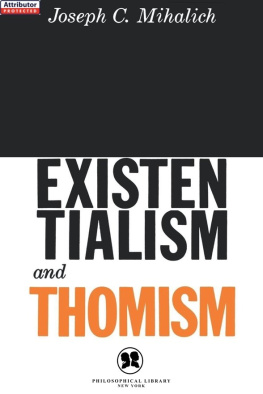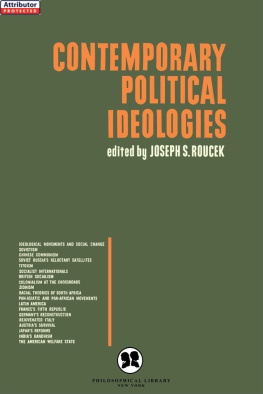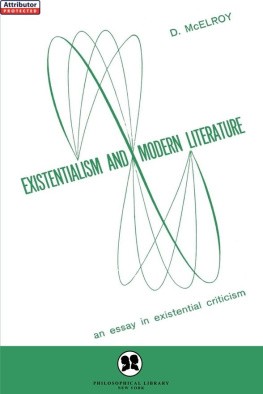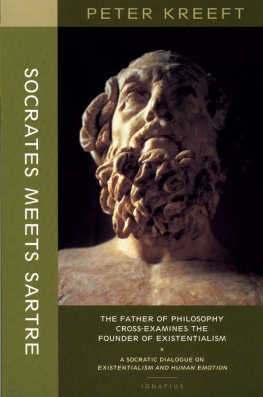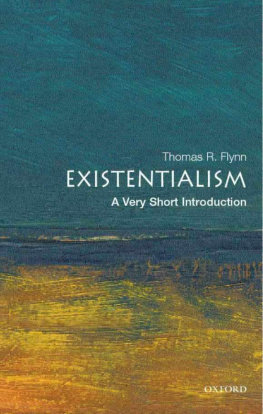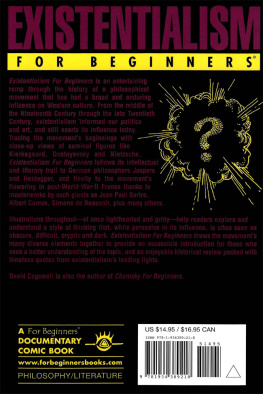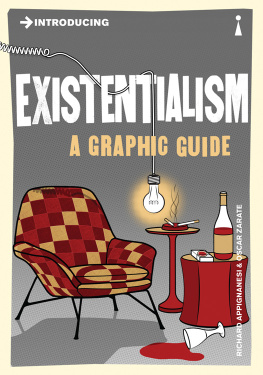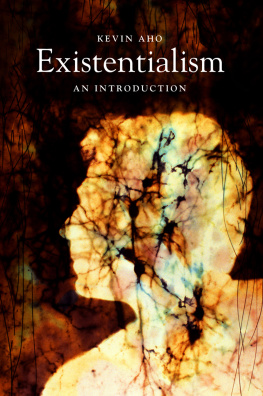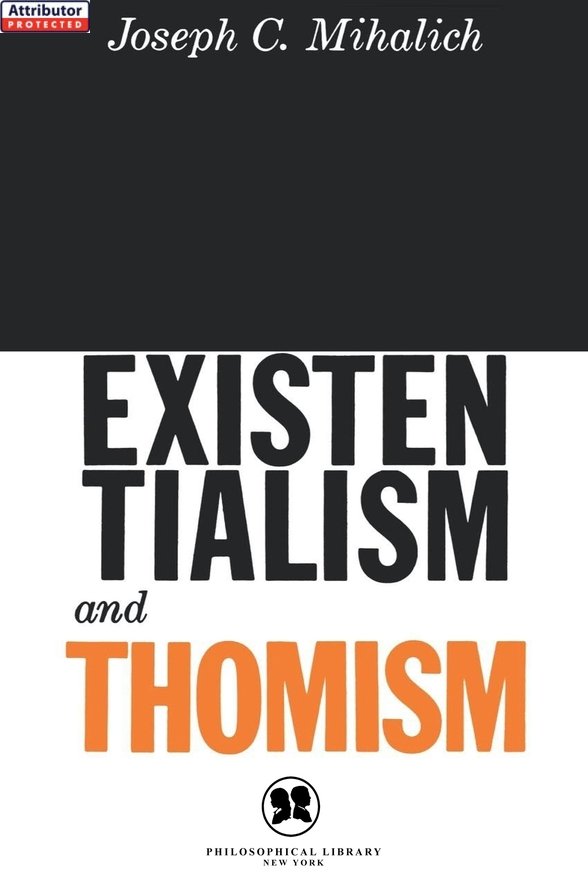SUGGESTED READINGS
Allen, Edgar L., Existentialism from Within, London, Routledge & K. Paul, 1953
Barrett, W. C., Irrational Man, Garden City, N. Y., Doubleday, 1958
Blackham, H. J., Six Existentialist Thinkers, London, Routledge & K. Paul, 1952
Collins, James, The Existentialists, Chicago, Regnery, 1952
Copleston, F. C., Existentialism and Modern Man, Oxford, Blackfriars, 1948
, Aquinas, Penguin-Pelican, 1955
Desan, Wilfrid, The Tragic Finale, Harvard University Press, 1954
Gilson, Etienne, Being and Some Philosophers, Toronto, Pontifical Institute of Medieval Studies, 1949
Grene, Marjorie, Dreadful Freedom, University of Chicago Press, 1948
Harper, Ralph, Existentialism, Harvard University Press, 1948
Lauer, J. Quentin, The Triumph of Subjectivity, Fordham University Press, 1958
Maritain, Jacques, The Degrees of Knowledge, translated under the supervision of Gerald B. Phelan, New York, Scribners, 1959
, Existence and the Existent, New York, Pantheon, 1948
Mounier, E., Existentialist Philosophies, New York, Macmillan Co., 1949
Wahl, Jean, A Short History of Existentialism, New York, Philosophical Library, 1949
SOME ASPECTS OF FREEDOM IN SARTRES EXISTENTIALISM
Prefatory Note
Jean-Paul Sartre is the most widely known of the leading figures in continental existentialism. He was born in Paris in 1905, the son of an officer in the French Navy. After a checkered scholastic career, Sartre taught philosophy for several years prior to his active participation in the French resistance movement during World War II. He enjoyed immense popularity in the immediate post-war period, a popularity not without its shortcomings since it tended to emphasize the eccentric individuality of the avant-garde rather than the subtleties of Sartres formal philosophy. Fortunately, left-bank bohemianism is a transitory and incidental aspect of Sartrian existentialism. In accordance with the existentialists penchant for dramatizing philosophical themes. Sartre is famous more for his novels and plays than his purely philosophical works. He is best known for his novel Nausea, along with a quartet of short-run plays No Exit, The Flies, Dirty Hands and The Respectful Prostitute. His major philosophical work is the comprehensive Being and Nothingness, an Essay on Phenomenological Ontology. Others include The Transcendence of the Ego, The Psychology of the Imagination and Existentialism, a convenient but severely truncated statement of his general position. All of these works are available in translation.
Philosophical criticism is complicated by the fact that different philosophical systems assign diverse meanings to common terms and concepts. The notion of individual freedom is a case in point. Jean-Paul Sartre advances a wholly unique interpretation of personal freedom, an interpretation that possibly exceeds all previous definitions in the history of philosophy. For Sartre, freedom is the human reality. Human existence is constant choice, and the prerequisite for such existence is absolute freedom. Sartre makes human reality and freedom synonymousto be human is to be free. This is a radical departure from the traditional notion of freedom as the absence of intrinsic and extrinsic restraint in the physical and moral orders. This latter view holds that the human agent is free to choose one finite good rather than another (or not to choose at all), even though the human volitional faculty (will) is necessarily ordained to Infinite Good as its natural end. Thus freedom is a condition of existing rather than being or existence itself. We are free to act in a certain way or not to act at all, but our free activity is not our very being.
If it is possible (let alone advisable) to sum up a philosophy of being in one sentence, this sentence from Sartres novel Nausea might suffice: Every existing thing is born without reason, prolongs itself out of weakness and dies by chance. Allowing for dramatic license, these words contain Sartres basic thesesviz., that existing is absurd ( de trop ) in that it cannot be explained or justified; that existing itself is fraught with confusion and bad faith; and that death too is de trop and wholly beyond anticipation and preparation. Sartre aligns two notions of being, Being-for-itself ( pour-soi ) and Being-in-itself ( en-soi ). Being-for-itself is human reality, and human realityin addition to being absolute freedomis pure consciousness. Being-in-itself is all elseeverything that is not human reality. Unlike the For-itself, which is pure consciousness, Being-in-itself is dumb packed-togetherness and rigid non-consciousness. The two regions of being are unalterably opposed: consciousness must always remain consciousness, and massive being must remain passive and dumb. This radical bipolarity is the crux of Sartres doctrine. This is so because the pour-soi or For-itself expends its existence in a constant effort to become something in its own rightBeing-in-itself. This can never be. To become something, to become Being-in-itself, Being-for-itself would necessarily have to renounce its consciousness. But this would give rise to a dual contradiction. It is a contradiction to posit Being-for-itself which is not full and complete and pure consciousness, and it is equally contradictory to posit Being-in-itself which is knowledgeable and conscious. Therefore the pour-soi or Being-for-itself must constantly seek and never find. It must remain lured by being without any hope of achieving its goal.
The notion of human reality as absolute freedom flows from the peculiar negativity which characterizes it in Sartres philosophy. In the manner outlined above, human existence (Being-for-itself) is continually out of itself and in flight toward the stability and permanence represented in Being-in-itself. Human reality must remain wholly translucid: the slightest measure of permanence (even the permanence of an egological structure) is anathema. Permanence kills consciousness, and consciousness is the raison dtre of the pour-soi. Being-for-itself must remain actually nothing (no thing) and therefore is not bound by the causal limitations of thingness. Being-for-itself is sheer, pure freedom because it comes from no cause and finds its reason for being in its own activity. The basis of this reasoning is Sartres contention that existence precedes essence, meaning that mankind is nothing else but what the individual man makes it to be. There is no universal essence or nature according to which man might pattern his actions and conduct. There is no abstract human nature because there is no God to conceive it. Sartre admits to being an atheist, but he is frank about the consequences:
(The existentialist) thinks it very distressing that God does not exist, because all possibility of finding values in a heaven of ideas disappears along with Him; there can no longer be an a priori Good, since there is no infinite and perfect consciousness to think it.... If God does not exist, we find no values or commands to turn to which legitimize our conduct. So, in the bright realm of values, we have no excuse behind us, nor justification before us. We are alone, with no excuses.
Man is condemned to be free and is left to create or invent his course of action in accordance with the concrete situation which faces him.
An important point about the Sartrian notion of freedom is the fact that the boundlessness of this freedom does not turn it into license. Despite a rather prevalent misconception, Sartres existentialism is not developed as a systematic opportunity for the exercise of whim and caprice. We are free, but not free to do anything we please with no regard for the consequences. On the contrary, such drastic freedom brings with it immense responsibility. Since I make my world in concert with other human realities, the finished product is a concrete manifestation of my wisdom or my folly. A fundamental premise in Sartres doctrine is the need for the individual to be consciously involved, to belong, to be engag. The result is that man acts not in a kind of socio-personal vacuum, but rather in the context of a concrete situation in which he himself is necessarily involved. The individual man chooses and acts, but his choice and his action involve all mankind. For Sartre, moral choice (human activity) is pure invention likened to artistic creation. It is unrealistic to ask (with reference to an artist), What painting ought he to make? We recognize the fact that there are no a priori aesthetic values and that the measure of the painting is the degree of correspondence between what the artist intended and the result. Man the artist and man the ethician have this in common: both are necessarily free and individualistic, but neither the work of art nor the human deed is properly arbitrary.

